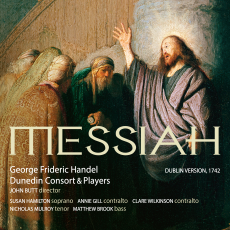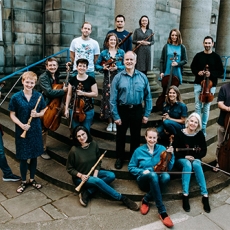Handel's Messiah - Atlanta Audio Newsletter
From our Linn friends in Scotland comes an attractive new recording of Handel's Messiah in the 1742 Dublin version, performed by the Dunedin Consort and Players under director John Butt. Why Dublin? One reason that comes to mind is that it was the first place where Handel's masterpiece was a success. Hard as it is to believe in view of the fact that Messiah is now a universal classic (it was, in fact, the first classic, in terms of being revived year after year, in the history of music), it was a dismal failure in its early performances in London. The change of scenery was just the tonic it needed. The lilting quality of Handel's arias must have appealed strongly to the Irish. In addition, Dublin was far enough away that Handel was able to use one of his favorite singers, Susannah Cibber, who was then box office poison in London due to an extramarital affair that had dragged through the courts. In the Dublin version, he gave her many of the recitatives and arias that we are accustomed to hearing sung by other, particularly tenor, voices, including the final aria "If God be for us." (In this recording, her part is sung very capably by contralto Claire Wilkinson.)
Always the resourceful composer, Handel was adept at tailoring the vocal parts to the singers at hand. One striking difference is the soprano aria "Rejoice greatly, O Daughter of Sion," which sounds quite different from the version we're used to hearing due to the additional color and the bouncy spring rhythm Handel added to his writing.(Here, the part is sung by Susan Hamilton, whose light soprano is a pure pleasure whenever heard.) On the other hand, the Dublin version of the bass aria "And I will shake all nations" doesn't have the sensational trumpet-like intonazione that we're accustomed to hearing, though in other respects the part (sung here by Matthew Brook) follows the familiar lines.
Through historical research, the Dunedin Consort determined that Handel had a small chorus available in Dublin, no more than three or four voices to a part. Here the vocalists (who include, besides those already mentioned, tenor Nicholas Mulroy and alto Annie Gill) double as members of the ensemble. The big choruses in Messiah ("Unto us a Child is born," "Worthy is the Lamb," and of course, "Hallelujah!") are accordingly not the sonic blockbusters we are used to hearing. On the other hand, the Consort can sing in a more relaxed manner, so the choruses can be smoother and less hurried. An additional plus is the excellent diction of these singers (should that surprise us about the Scots?). This is one time when you don't need to have the booklet firmly in hand in order to understand an oratorio in English! Special kudos for trumpet players Chris Dicken and Paul Sharp in the splendid final chorus.
In conclusion, this Messiah is different, but with an undeniable charm that is hard to resist.

